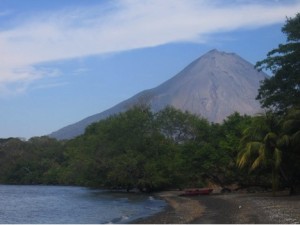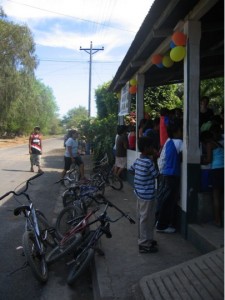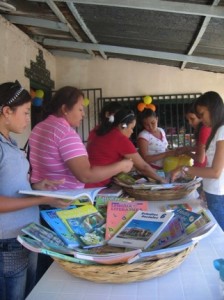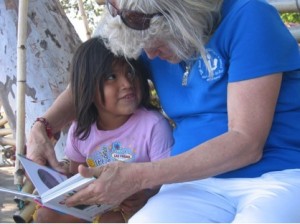
Ometepe is an island in the middle of Lake Nicaragua that has two active volcanoes on it. Concepcion, shown in the picture above, erupted on the day we arrived sending ash plumes 7,000 feet into the air. Lake Nicaragua is one of the largest fresh water lakes in the world and Ometepe is accessible by ferry, the ride took a little over an hour
By, Lauren Vander Zanden
I?ve been involved with the San Juan del Sur Biblioteca since last January when I volunteered with a group of eight other Simmons students. Over spring break I returned as a student in the International Librarianship course. As with last time, I was struck by just how much of an uphill climb it has been for Nicaraguans to have lending libraries. Prior to Jane Mirandette founding the San Juan del Sur Biblioteca there was not the model of a lending library in Nicaragua, rather the few libraries in the nation had closed stacks. While closed stacks are beneficial for a number of materials, especially those that are rare and valuable, it is not a system that puts books into the hands of school children and encourages them to read. The lack of lending libraries, either public or school libraries, in addition to the significant cost of books in Nicaragua meant that the majority of the population was unable to experience either the joys of being read to or reading for pleasure. While as students we can discuss the relative merits of a reading culture and how importing that concept effects pre-existing culture the reality is that without any access to books Nicaraguans are not able to make the choice for themselves to read or not to read.

At the inauguration of the new library in Ometepe, the event was a huge success with a massive turnout from the community. In honor of the opening there were musical performances by Mario Montinegro, folk dance performed by local children, and even a recitation of Ruben Dario?s poem A Margarita.
With Mirandette?s library now established in its community, along with a mobile book project that serves over 30 outlying communities, there are other library initiatives that are also following the lending library model. During our trip we were fortunate enough to spend a great deal of our time traveling with a group of librarians and volunteers from a library in Tipitapa, all of whom are Nicaraguan. Rosa and her daughter Karen started a library in a section of their home, with the assistance of the Wisconsin/Nicaragua Partners project, because they felt the need for a library in their community so keenly. This library has now been established for several years and they have also included a mobile project where they are involved in community outreach by lending books at a local landfill where children are often sent by their families to scavenge. Three of the young women in their group were volunteers in their early teens, they all came from troubled homes and were members of the softball team that Karen and Rosa had started at their library. As significant as it is to provide books for children and adults, these new lending libraries in Nicaragua are not just a place for individuals to read, but also a safe haven, a quiet place, a chance for discovery, and for empowerment.

The staff and volunteers from Tipitapa and the San Juan del Sur Biblioteca setting out all of the books at the new library in Ometepe.
The Tipitapa librarians accompanied our group and the SJDS Biblioteca staff to Ometepe where a new library was inaugurated. The library had actually been in existence for over a year but the books were not being used at all and a desk was positioned directly in front of the bookshelf preventing anyone from browsing or reading any of the books. As part of our time there, we processed the new books that were being donated to the library, cleaned the books that were there, and reorganized the library and the bookshelf to make the books more accessible and make the space more welcoming. This was achieved by putting the books for younger children in bins where they can be easily grabbed by kids, while other books were categorized as young adult fiction and non-fiction, and then adult fiction and non-fiction. To finish the desk was moved, and colorful posters and signs were placed around the library to make it feel more welcoming and made it clear the books were to be loaned. During this time the young volunteers from Tipitapa not only assisted with all the library work but did face painting and Twister, listened to the music performances, and clearly enjoyed and took pride in the role they were playing. As a graduate student it was exciting for me to see a younger generation involved in library work and committing themselves to those endeavors. Both Tipitapa and San Juan del Sur have a number of younger volunteers from the community who consistently work on library initiatives. To have such enthusiasm coming from a young population shows how significant lending libraries are becoming in Nicaraguan communities. I?m excited to see what the future will bring for this generation that will have had the opportunity to grow up with access to books and with lending libraries in their lives.
Jane Mirandette is one of the most remarkable and inspirational women I have had the honor of meeting. Eight years ago she saw a need in her community in San Juan del Sur and chose to make herself part of the solution rather than a passive sympathizer. Her model of a lending library and her ?library in a box? system has acted as a catalyst and encouraged many other individuals or organizations both in Nicaragua and from abroad to establish either lending libraries in Nicaragua, or reading corners and public libraries. At sixty-five she continues to tirelessly dedicate herself to the success of the library and she recognizes that its ongoing success is dependent upon the involvement of Nicaraguans such as Karen and Rosa and all of the staff that works at the San Juan del Sur Biblioteca. To assist with this she is actively involved in holding workshops that provide professional development and support for librarians, as well as being a member of the national library organization in Nicaragua, ANIBIPA. None of the Nicaraguans we met with may have had library science degrees or consider themselves to be ?information professionals? but the work they are doing every day is at the heart of our profession. They recognize that a democratic society requires free access to information and that every individual has the right to read, to learn, and to think.
